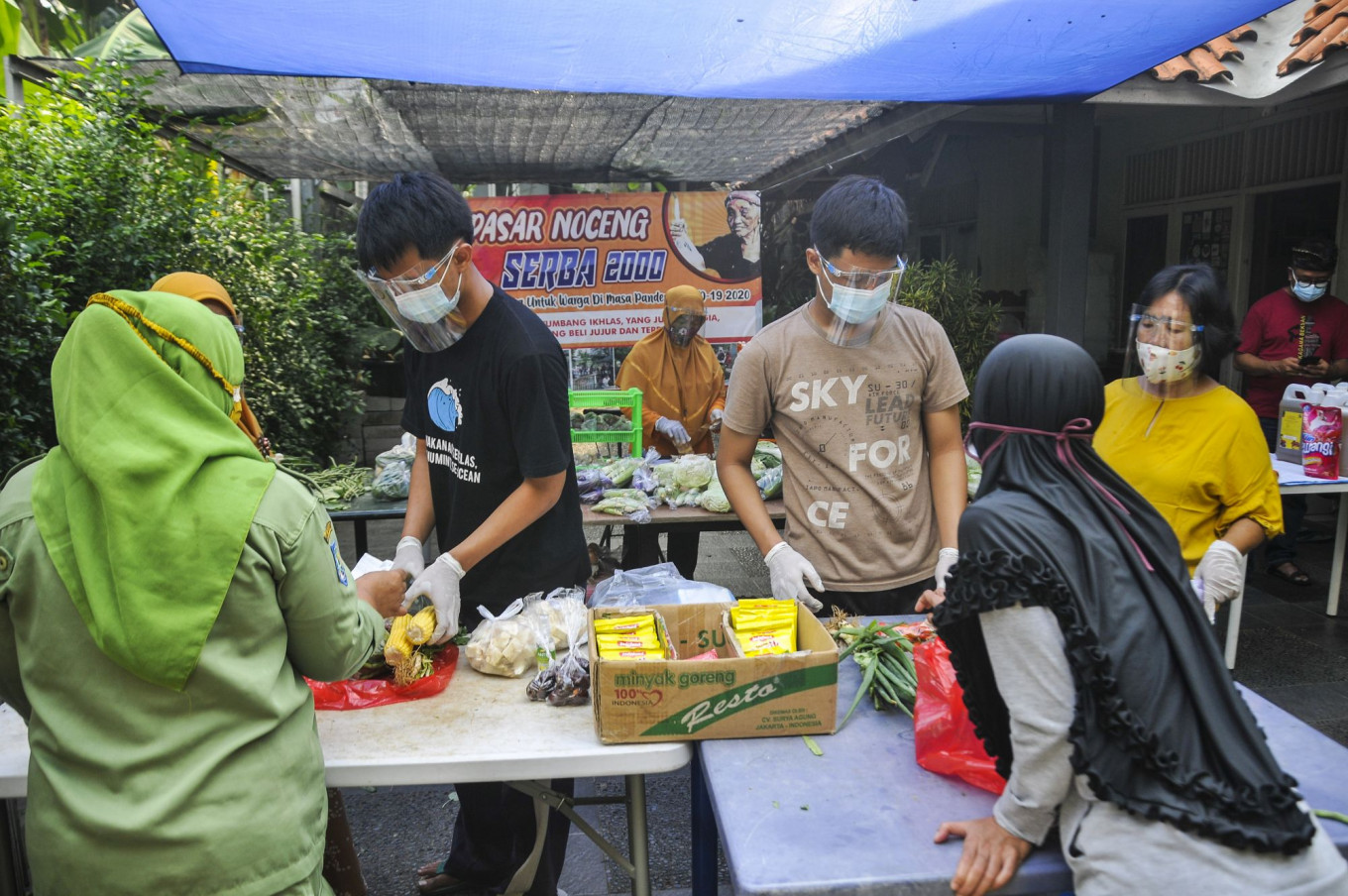Popular Reads
Top Results
Can't find what you're looking for?
View all search resultsPopular Reads
Top Results
Can't find what you're looking for?
View all search resultsBekasi residents set up cheap market to help neighbors affected by COVID-19
Residents of Pondok Hijau Permai housing complex in Pengasinan village, Rawalumbu district, Bekasi city, have opened Pasar Noceng, where all products are sold for only Rp 2,000 (13 US cents) to Rp 5,000.
Change text size
Gift Premium Articles
to Anyone
 Bekasi residents shop at a pop-up cheap market called Pasar Noceng that offers various items with prices ranging from Rp 2,000 (13 US cents) to Rp 5,000 in Rawalumbu district, Bekasi city, West Java, on Sunday. The market is aimed at helping Bekasi residents who have been hit hard by the pandemic to purchase basic needs at an affordable price. (Antara/Fakhri Hermansyah)
Bekasi residents shop at a pop-up cheap market called Pasar Noceng that offers various items with prices ranging from Rp 2,000 (13 US cents) to Rp 5,000 in Rawalumbu district, Bekasi city, West Java, on Sunday. The market is aimed at helping Bekasi residents who have been hit hard by the pandemic to purchase basic needs at an affordable price. (Antara/Fakhri Hermansyah)
H
aving seen the many people who have lost income and even their jobs during the COVID-19 pandemic, a group of people in Bekasi, West Java, has decided to open a market that sells goods at affordable prices for those affected.
Residents of Pondok Hijau Permai housing complex in Pengasinan village, Rawalumbu district, Bekasi city, have opened Pasar Noceng, where all products are sold for only Rp 2,000 (13 US cents) to Rp 5,000.
“This market is for social care, considering the many people affected by COVID-19. We have heard complaints about [expensive] vegetables and staples during the pandemic,” market coordinator Teguh WS said on Sunday, as quoted by kompas.com.
Teguh said residents initially started providing free vegetables in late June to several affected neighbors in the complex under the “Kagama Canthelan” program.
“Well, it turned out that there were lots of enthusiasts and the food always ran out,” said Teguh.
On July 9, Teguh and his friends changed the concept to Pasar Noceng, open once every three days, and added more types of vegetables.
Teguh said more than 30 types of fresh vegetables and staples consisting of 700 items had been sold at the market.
Roughly 150 buyers come to Pasar Noceng every day it is open. To make sure all residents have access to the cheap basic commodities, a purchase limit is set at five to seven types of goods.
So far, Teguh said, many donors had reached out to the market and helped subsidize the cheap food, allowing more basic ingredients to be offered to the community.
Recently, Pasar Noceng launched another subsidized program, selling cheap cooking oil and flour to hawkers and small traders every six days.
Under the program, buyers receive 5 liters of quality cooking oil for only Rp 38,000 to Rp 42,000, about two-thirds the usual price.
“We hope we can help reduce the capital and increase the profit margin of the traders,” Teguh said.
Earlier this month, Bekasi imposed a curfew to limit people’s movements amid a spike in COVID-19 cases. The city administration issued a decree ordering public spaces like shopping centers, restaurants and other entertainment facilities such as pubs and karaoke bars to close at 6 p.m.
Later on, the mayor decided to no longer apply a curfew on business establishments, allowing them to remain open until between 9 p.m. and 11 p.m.
According to tempo.co, business activities had begun returning to normal as of Oct. 10. Chain retail shops, which previously closed at 6 p.m. during the strict curfew, were seen closing up at 10 p.m.
As of Sunday, Bekasi had recorded 5,444 confirmed COVID-19 cases, with 4,624 recoveries and 134 fatalities. (syk)
Editor’s note: This article is part of a public campaign by the COVID-19 task force to raise people’s awareness about the pandemic.









